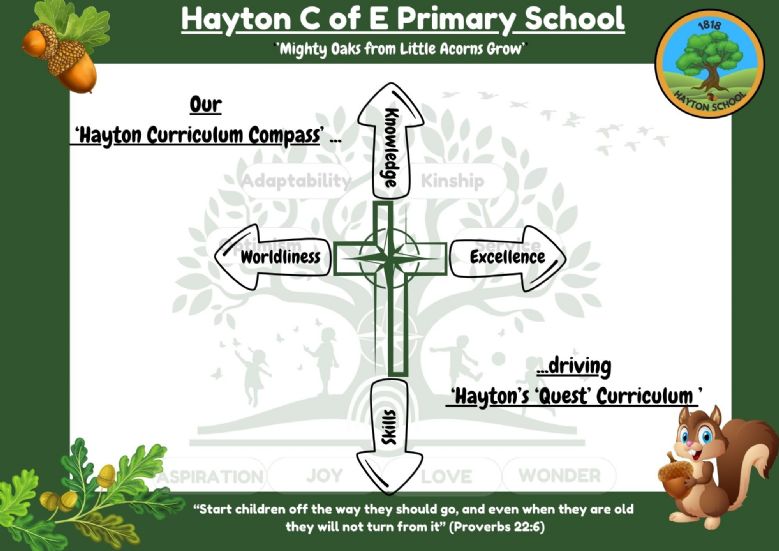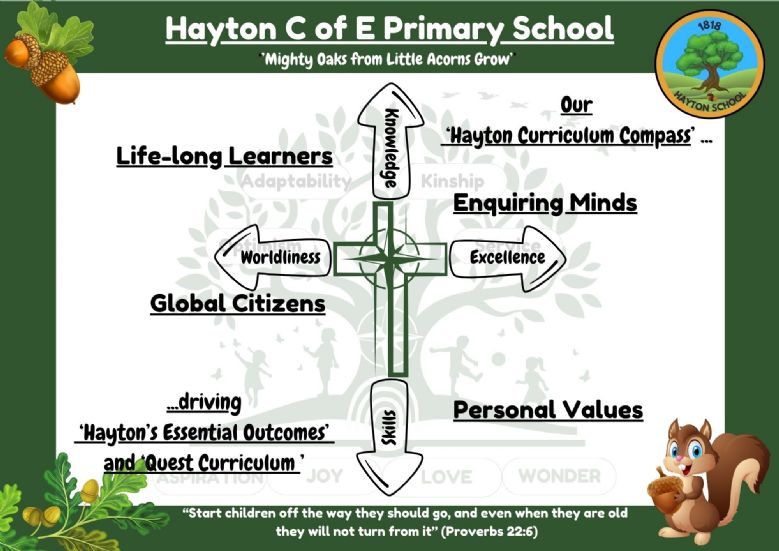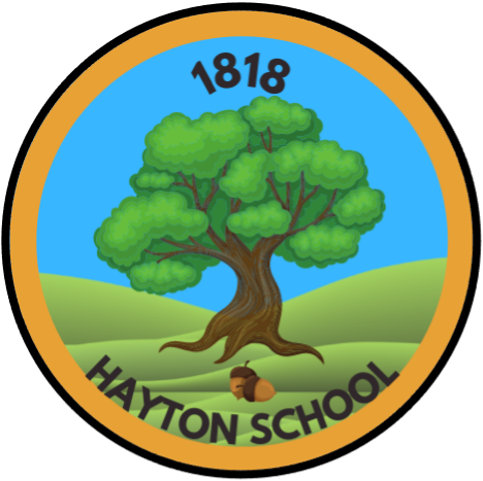Our Quest Curriculum
Hayton's Learning 'QUEST' Curriculum
“To begin is the most important part of any quest and by far the most courageous.” - Plato
“He who completes a quest does not merely find something. He becomes something.” - Lev Grossman
“The greatest quest in life is to reach one’s potential.” - Mychal Wynn
Pupils at Hayton Church of England Primary School are easy to distinguish by the personal qualities they present. They are happy, confident, articulate children with a love of learning, strong personal values and enquiring minds. They are generous, kind, polite and welcoming; they are forgiving and understand justice. With God securing their roots, they face the world with love, joy, aspiration and wonder.
What we believe:
At Hayton C of E Primary School, we are committed to providing an ambitious, purposeful and empowering curriculum that fully prepares learners for the next steps in their school career and opens the doors to the wider world. Core literacy and numeracy skills are at the heart of all we do and our ambitious curriculum provokes curiosity and excitement, all leading to deeper learning.
Everything begins with our curriculum drivers (our ‘Hayton Curriculum Compass’). These are woven through all that we do and underpin our shared belief that our role is to support children in aspiring to achieve, understanding their place in the world and broadening their horizons, all intertwined within a knowledge-rich curriculum.
We ensure that our curriculum is accessible for those children with disabilities or special educational needs and that our curriculum complies with the Equality Act 2010 and with the Special Educational Needs and Disability Regulations 2014.
We believe it is our responsibility to show children that at there is a world of possibility awaiting them, outside of the school gates. We also strive to encourage a love of learning that will last a lifetime as well as develop the skills for life-long learning and ‘life’.
The Hayton ‘Curriculum Compass’:


KNOWLEDGE is our NORTH: Knowledge-Rich Curriculum
Children’s acquisition of knowledge and vocabulary is developed rigorously and over time, in order for children to retain and use – research suggests that the knowledge and vocabulary children ‘own’ has a significant impact on their future life-chances.
As Hirsch writes, knowledge should be thought of as ‘mental Velcro’.
"Nearly all of our most cherished ideals for education- from reading comprehension and problem solving to critical thinking and creativity- rest on a foundation of knowledge." - ED Hirsch
People who have lots of subject-specific knowledge find that new knowledge ‘sticks’ to it, helping them commit the new information to long-term memory. In the same vein, a lack of subject-specific knowledge can mean that new concepts slip past you or that you make mistakes. The outcome of this is completely predictable: those with more prior knowledge learn more than those with limited prior knowledge, and therefore the gap between these two groups widens.
In ‘The Schools We Need And Why We Don’t Have Them’, Hirsch describes this as the ‘Matthew Effect’, drawing on Matthew Chapter 25: “For to everyone who has, more shall be given, and he will have an abundance; but from the one who does not have, even what he does have shall be taken away”.
In her book, ‘7 Myths About Education’, Daisy Christodoulou states: “The difference between experts and novices is that experts have a huge body of background knowledge and processes stored in long-term memory, and that they have spent a huge amount of time practising using that knowledge and those processes. In most fields, it takes several years and thousands of hours to become an expert.”
EXCELLENCE is our EAST: Aspiring to Achieve
Our curriculum is underpinned by excellence. We have high expectations and aspirations for all of our children and, in doing so, we expect the highest quality of learning design and the highest quality of learning produced. These expectations are delivered and reinforced daily through adult modelling, peer learning and celebrating successes
SKILLS are our SOUTH: Understanding Our Place in the World
As Guy Claxon and Bill Lucas stated in ‘Education Ruby’ (2014), “Bluntly, you can teach the Tudors in a way that develops the habits of independence, imagination, empathy and debate; or you can teach them in a way that develops passivity, compliance, credulity and memorisation.” (p.76) Hence our values are dedicated to children’s understanding and developing their place in the world, their ability to learn from Christian values and the life-skills they will need as they develop from ‘little acorns into mighty oaks’.
WORLDLINESS is our WEST: Broadening Horizons
Experiential learning, be it: visits, visitors, working with the local community …are at the heart of our curriculum in order for our children to develop their thirst for new learning and experiences; to experience ‘awe and wonder’ , and to widen their own personal ‘cultural capital’. We want children to enhance their knowledge and experiences of the world and their place within it and how they can all contribute as valuable and respectful 21st century citizens. The children of today are the adults of tomorrow. The children of our school are our future.
Our curriculum is tailored to the needs of all of our children. Significant people (VIPs) have been woven through each area of our curriculum. These include people of local, national and international significance. The study of significant individuals brings life to our learning, meaning children are more likely to recall key facts and events.
Our sequential curriculum ensures that knowledge is cumulative. Substantive and disciplinary knowledge is at the heart of each subject and linked areas of study are exploited in order to consolidate and embed learning across the curriculum, meaning that mental models are developed over time. At Hayton C of E Primary School, we pride ourselves on evidence-informed practice. We understand that memory lies at the heart of learning and therefore we plan opportunities for children to recall and remember. This allows memories to be strengthened, meaning that children can draw on previous learning with confidence in order to build and connect.
We understand the importance of building children’s vocabulary; we achieve this through carefully chosen and ambitious shared texts, as well as the explicit teaching of new and ambitious words, relevant to learning. Subject-specific vocabulary is mapped across school and children use this in their independent work.
A shared love of literature sits alongside our curriculum drivers and underpins all that we do; books are the building blocks of our rich curriculum. We harness the power of story; texts are valued both as a key learning resource across the curriculum, and for pleasure and escapism. Our reading bookshelves outline the stories shared in each year group, while our 'Reading Without Limits' give structure to children’s reading diet. Texts we share are inclusive, ensuring representation of gender and ethnicity.
Inclusive to all learners, Hayton celebrates individuality and embraces difference. As a school community, we learn from each other and share experiences, thoughts and ideas in order to develop shared tolerance, acceptance and understanding. At the end of children’s time with us, we proudly say goodbye to confident and resilient individuals who are fully prepared for the next steps in their education, and who understand the difference they can make to their community and the wider world.
How we do it:
Our curriculum is carefully sequenced: progression documents clearly outline both the knowledge and skills developed in each area of study. Dedicated time for revisiting key knowledge is carved into each half term and class teachers’ planning builds in time to recap previous learning in order to then build on knowledge and understanding in new, related areas of study.
Purposeful links are made across the curriculum, meaning that knowledge and understanding is consolidated.
We value the power of authentic experience; learning is brought to life and given relevance and meaning. We therefore carefully map trips, excursions and in-school events across school, supporting our key driver of ‘Worldliness: Broadening Horizons’ by ensuring a balance of coastal, urban and rural experiences.
What will I see if I visit a lesson in Hayton C of E Primary School?
Creative, dynamic and passionate staff: At Hayton, we love learning. Class teachers and other staff work collaboratively to bring children’s learning to life through planned experiences, which make learned content both memorable and engaging.
‘GREAT’ Expectations:
G: good to talk; even better to listen
R: respect yourself each other and your environment
E: enjoy and achieve responsibly
A: able to make mistakes and learn from them
T: ‘TOGETHER’ we are #teamhayton where we all ‘REACH FOR THE STARS’!
'GREAT' Expectations
Clear, detailed explanations and modelling: We fully understand the importance of teaching being explicitly clear, and tailored to individual need. The use of WAGOLLs and WABOLLs (What a good/bad one looks like) means that expectation is clear and children are scaffolded during independent practice. Children across school are taught to analyse shared examples in order to identify key ingredients for success. Support is layered; class teachers’ keen understanding of assessment allows them to know each child as an individual and know when the time is right to remove elements of support, guiding the child to independence, at a pace right for them.
Skilful teacher questioning: Questioning is used to support learners in reaching their potential. A mix of strategies allow class teachers to direct questions to individuals where necessary, or use a ‘no hands up approach’ to allow children to contribute freely. To stretch children to the appropriate cognitive level, class teachers use prompts and cues to extend thinking. To develop this further, class teachers probe for reasoning and clarification, and, as pupils move further up the school, they are taught to give full, detailed and reasoned responses.
Spaced retrieval of key learning: At Hayton Primary School, we have developed a number of strategies, which support children in the recall, and retention of key knowledge. These are drawn upon during low-stakes assessments and prior to the teaching of new, yet related, content.
Clear learning which are appropriately challenging: Our aim is for children to remember key knowledge, but also to develop a full understanding of it in order to then apply their learning in context, creating authentic outcomes, which draw on their learning experience over time.
Hard Thinking: We think carefully about tasks which allow children space to attempt putting new learning into practice. Low-stakes tasks allow misconceptions to be addressed before children commit to working in books. We also value thinking hard; this type of active learning supports working memory and helps children to embed key knowledge. Class Teachers are skilful at ensuring that all children are expected to ‘think hard’ and tasks are designed to support this.
A happy, smiling ‘family’: everyone is a part of #teamhayton and we believe everyone in our ‘school’ family are unique and valued gifts from God. In order for children to flourish, for everyone to flourish, we wholeheartedly believe that our school is built on 'love'. We strive to build happy, trusting relationships with everyone within our school, built on the foundations of our Christian and School values, focused on trust and mutual respect. As such, with these strong, trusting relationships comes individuals who ‘want’ to be in school, who ‘want’ to learn and who ‘want’ to strive to do their very best, both for themselves and each other.
Beautiful Work (VIPs): At Hayton, we celebrate beautiful work! Driven by our value of ‘pride’, we teach children the importance of well-presented, carefully planned work. Children are proud to display their outcomes; resilience, effort and progress are praised.
A love of reading: Books permeate our curriculum. Reading is at the heart of our school. We believe that children’s future life chances are inextricably enhanced by a love of reading.
How do we know we are having an impact?
Children at Hayton C of E Primary School value education and love learning; they understand that in knowledge lies opportunity. Learning is revisited and built upon to ensure a breadth and depth of understanding within and across curriculum subjects. Skills are honed over time and used as a vehicle to access new knowledge.
Children leave Hayton C of E Primary School as literate and numerate, kind and caring, respectful and thoughtful individuals who have the skill-sets necessary in order to thrive at secondary school and beyond. We pride ourselves in the journey from ‘little acorns’ to ‘mighty oaks’. We see this through talking with our children about their learning and what they can remember; we see this through the links our children make across subjects and years groups when they talk speak about their understanding of a concept; we see this in our pupils’ wonderful work; we see this through the outstanding progress they make from their starting points with us and through their statutory assessment scores at the end of each key stage.
Children leave Hayton with the confidence to try new things and make mistakes, seeing the opportunity that lies within adversity. Our bespoke curriculum has been designed to get the best out of each and every learner. Children are resilient, hardworking and driven. They have been taught how to converse respectfully; how to value the responses offered by peers by celebrating ideas that aren’t their own, and how to politely disagree, offering their own thoughts and ideas. They stretch their own thinking by asking questions of both their peers and themselves.
Children at Hayton know and understand their role in society; they have a sound sense of self and contribute positively to their community. They are tolerant and understand that everyone’s voice should be heard and everyone’s views should be acknowledged and respected. They leave primary school armed with the core values of love, joy, aspiration and wonder. As 'mighty oaks' we want them to maintain their unique and distinctive 'Hayton pupil characteristics': happy, confident, articulate children with a love of learning, strong personal values and enquiring minds; generous, kind, polite and welcoming; they are forgiving and understand justice, facing the world with love, joy, aspiration and wonder. They are aware of their responsibility as a citizen of the modern world and have secure and developed moral foundations on which to further build.
